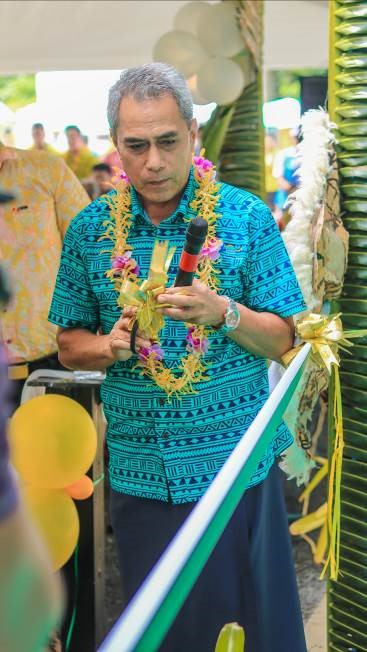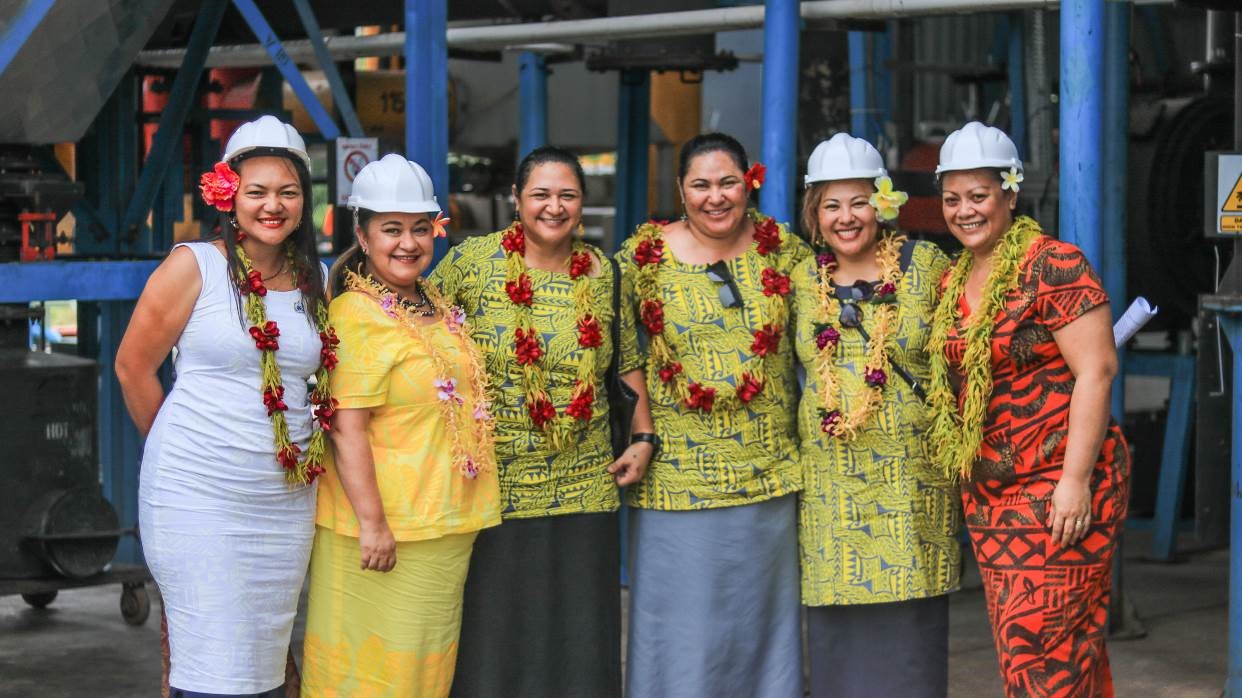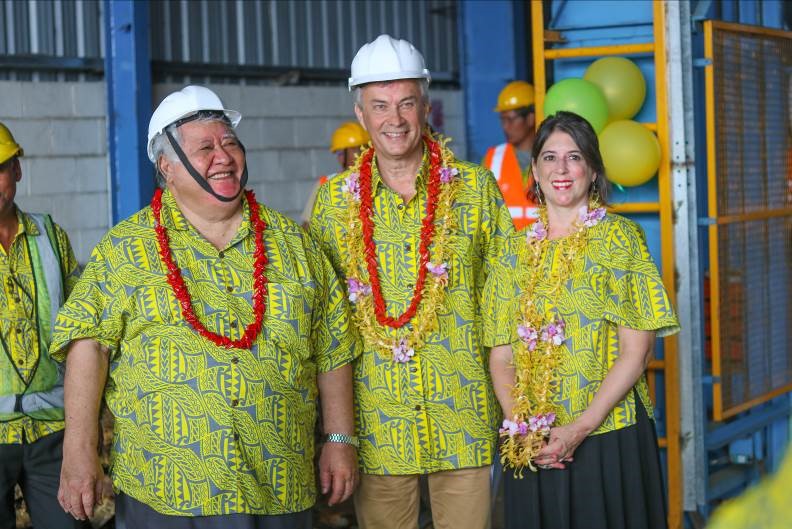Apia, Samoa – The official dedication of the $11.3 million Tala Afolau Biomass Gasification Power Plant
marks a new era for Samoa in its renewable energy efforts. The new Plant will produce five-million-kilowatt
an hour (kWh) of electricity per annum based on running the 750kw plant at 85 per cent of its capacity at 90
per cent of the time.
This is the first facility of its kind to be set up in Samoa and the region and will benefit up to 5,000 families on
the north-western side of the island of Upolu who will use electricity from this Plant.
The Plant will save the country up to 1.2 million litres of diesel per annum at a cost of $3 million Tala. It will
also reduce emission of carbon dioxide by 3.7 tonnes a year from a diesel power station, to add to the 60
tonnes per annum of total harmful gases that have been reduced through use by EPC of renewable energy
sources such as hydro, solar and wind.
“This project is one of the Government’s long term development goals to generate 100 per cent of the
country’s electricity needs from renewable energy sources by 2025, which is Samoa’s contribution under the
Paris Agreement, to reduce Green House Gas emissions, as well as reduce Samoa’s reliance on diesel as
we are now doing,” said Prime Minister, Tuilaepa Dr. Sailele Malielegaoi.
“At the moment, up to 50 per cent of our electricity needs are being produced by renewable energy sources
such as solar, wind and hydro power. We can now add biomass gasification – a new renewable energy
source for Samoa and countries in our region – to that list. This Plant also adds to Samoa’s contribution to
global efforts to reduce green house gas emissions or carbon dioxide which have depleted the ozone layer,
and which have severely impacted on global warming and climate change as we have seen recently with
cyclones Evan and Gita.”
The Plant is part of activities under the IMPRESS – Improving the Performance and Reliability of Renewable
Energy Power Systems in Samoa – Project. This project was funded by the Global Environment Facility
(GEF) via the United Nations Development Programme (UNDP), and the European Union and the
Government of Germany’s Government Agency of International Cooperation (EU-GIZ ASCE). The project
was implemented by the Ministry of Natural Resources and Environment, Ministry of Finance, Electric Power
Corporation (EPC) and the Samoa Trust Estates Corporation (STEC).
JOINT PRESS RELEASE
One UN House, Tuanaimato, Samoa | www.ws.undp.org
“UNDP is fully committed to working with the Government of Samoa in addressing the threat of climate
change. Samoa has shown great dedication in combating climate change by reducing greenhouse gas
emissions that contribute to global warming, amongst other commendable actions,” said UNDP Resident
Representative, Jorn Sorensen.
“The launching of this Plant has proven to the region and the world that Samoa remains true to its word and
means business when it comes to climate-proofing its future. The Biomass Gasification Power Plant has
made Samoa an example to other Small Island Developing States (SIDS) to emulate in the wise use of its
indigenous biomass resources as a sustainable energy resource, as well as incorporating it with Samoa’s
other developments in areas like agriculture as demonstrated by STEC.”
Construction for the Biomass Gasification Power Plant began in February 2019 and ended the same month
in 2020. It was connected to the EPC grid in April 2020.
The main contractor for the project was Ankur Scientific Energy Private Ltd, an Indian-based company that is
world renowned for this technology and have built similar systems worldwide, with local subcontractor Ah Liki
Construction Ltd for the civil works. Local contractor, Transworks Ltd, cleared the land and prepared the
three acre land on which the Plant is built, as well as constructing the security fence around the property.
King Construction is the other local contractor responsible for procuring heavy equipment from abroad for
cutting and harvesting wood for the preparation of the feedstock for the Plant.
As the Plant is built on Government land in Afolau, under STEC, and the forest of evasive trees is on this
STEC land, the Plant has been assigned to STEC to run as a business. STEC and EPC have entered into a
20-year-long Power Purchasing Agreement (PPA) for STEC to operate and maintain the Plant to generate
electricity and sell to EPC.
Biomass gasification is a process whereby wood chips are dried before feeding inside a gasifier in which,
without oxygen, produce syn gas at very high temperatures then cooled down before using to produce
electricity from gas generators. Weeds and invasive species like tamaligi, puluvao, coconut logs, husks and
coconut shells are chopped up and used as fuel to feed the biomass gasifier. The gas produced from these
will be cooled and pumped into generators to produce electricity that will feed into the EPC grid.
-ENDS-
For media queries, please contact:
Laufaleaina Lesa, UNDP Multi Country Office, Samoa|Tel. +685 23670|E: laufaleaina.lesa@undp.org
www.ws.undp.org @UNDP in Samoa, Cook Islands, Tokelau & Niue @undpsamoa
JOINT PRESS RELEASE
One UN House, Tuanaimato, Samoa | www.ws.undp.org
Toiata Uili, IMPRESS Project Coordinator, Ministry of Natural Resources and Environment, Samoa |
www.mnre.gov.ws
E: toiata.uili@mnre.gov.ws | Ph: +685 67200 | @samoa.mnre
*****
UNDP is the leading United Nations organization fighting to end the injustice of poverty, inequality,
and climate change. Working with our broad network of experts and partners in 170 countries, we
help nations to build integrated, lasting solutions for people and planet. Learn more at undp.org or
follow at @UNDP.
Hightlights of Afolau Launching



